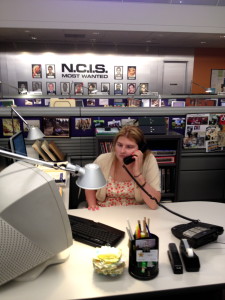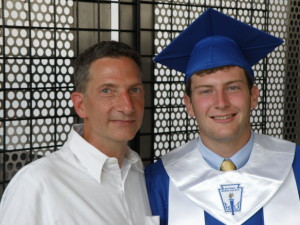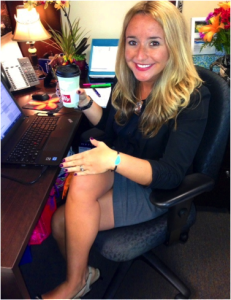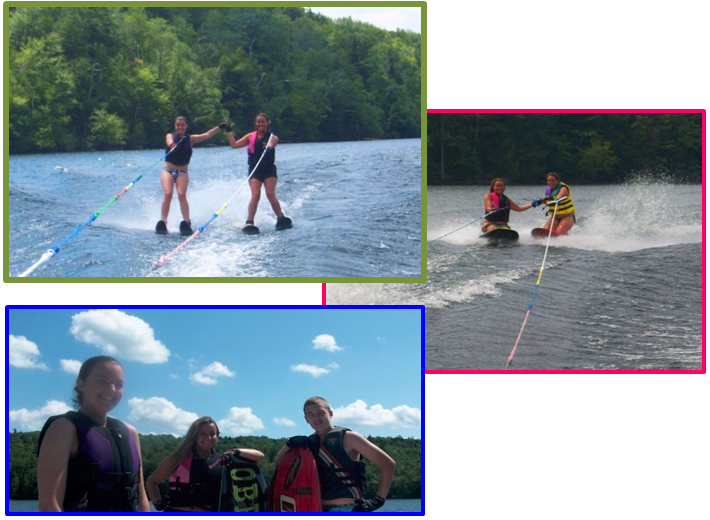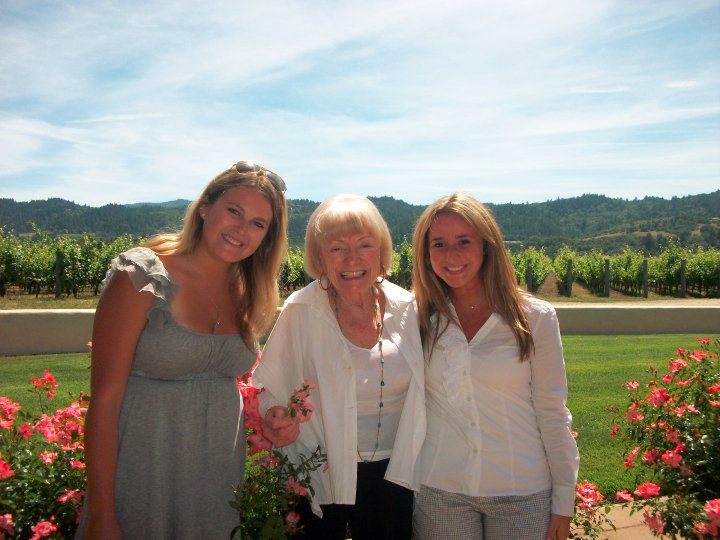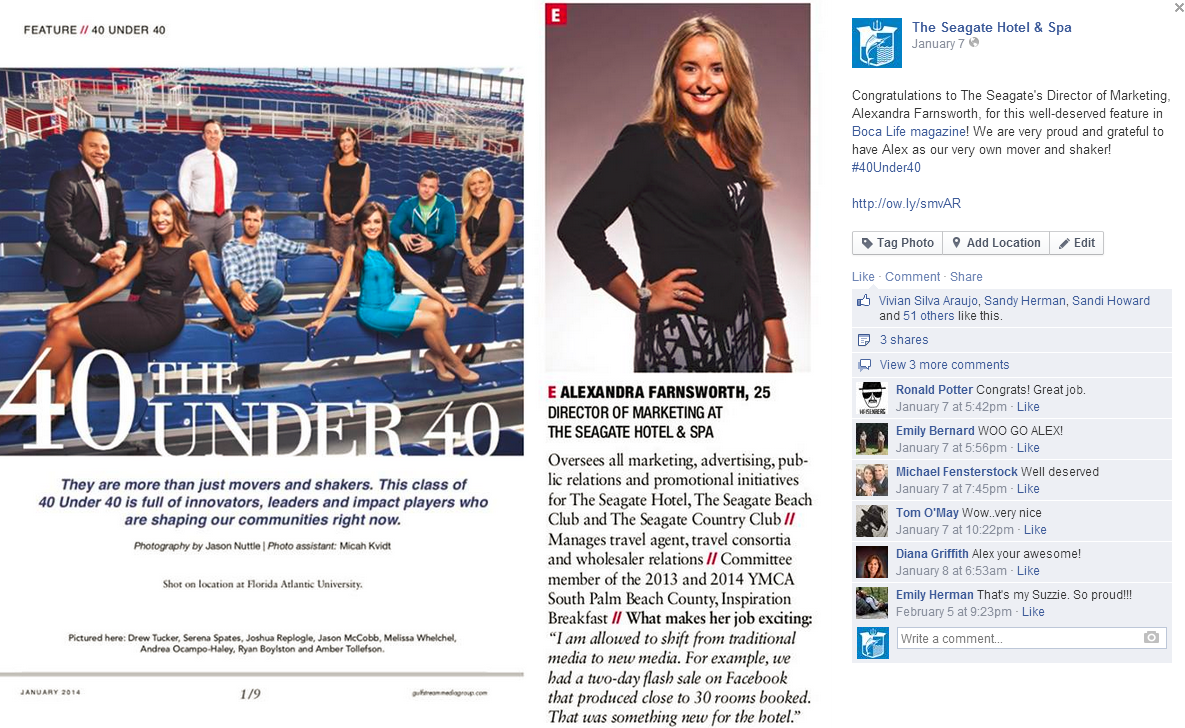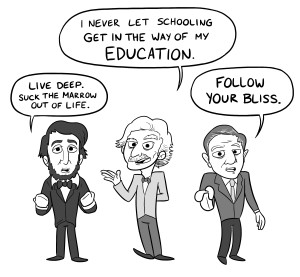First year students often feel like they’re in a holding pattern when it comes to career exploration. Not true. Before launching into internships, you can begin dipping your toes into lots of career prospecting waters by shadowing professionals every chance you get. I recommend starting during your very first semester at college (if you haven’t already begun in high school). Follow this Carpe Career! Plan to get started…
The Carpe Career! Plan
1. The List.
Between now and winter break, create a list of professional people (‘experts’) you know in your ‘field’ of interest, who might be able to provide some insights about careers. If you’re interested in Biology, but uncertain about which biological field to explore, cast a wide net. Do you have an uncle who’s a Biology professor? An aunt who’s a doctor? What about the veterinarian you’ve been taking your dog to for years? Are you on good terms with your high school biology teacher? What about that guest speaker from the local zoo? Wasn’t there a kid on your football team whose mom was a forensic biologist with the police department? All of these are great people to put on your ‘expert’ list. What if you’re interested in a very esoteric field, like computer game design, and you don’t know anyone who knows anyone who does that? Well, have you read any gaming magazines that mention the gaming gurus who are taking that world by storm? Throw those guys’ names on your expert list! It certainly can’t hurt.
What if you have absolutely no idea about anyone in your field of interest? What a great excuse to pop in and see your professors? Ask them if they have any names. Many professors have contacts all over the planet. (Good thing you’ve been cultivating all those great relationships with your profs!!) Your campus career center probably has an alumni network you can tap into, as well, and there’s nothing wrong with venturing online to see some cool TED Talks and contacting some of those ‘famous’ people.
2. The Letter.
Well, we know letters have gone the way of the cassette tape, so let’s just make it an email. Draft an email to everyone on your list (the more difficultly famous folks might take some resourcefulness to track down their addresses). This email should be short and sweet and to the point. You’re a student looking for some guidance. Here’s a template you can follow and modify as you see fit.
Subject: Student Seeking Advice
Dear Ms. Wisenheimer:
I am a first-year student at Clueless U. who is interested in (insert your career aspirations here) and looking for some guidance. I’m good at (insert some stuff you’re good at) and I’m especially interested in (insert stuff you like, general career ideas, or courses you like here), but I don’t have a good sense of how this might translate into career opportunities. If you would be so kind as to answer a few of these questions to the best of your ability, I would truly appreciate it.
- How did you prepare for your career?
- How did you break into it?
- What do you love about it?
- What do you hate about it?
- How do you spend most of your days?
I thank you, in advance, for any responses or additional advice you can provide.
Sincerely,
K. Reer Hunter
If you’re concerned about sending a ‘cold call’ letter out of the blue, don’t be. Most people would love an opportunity to help out a young student, and you’ve just given them the opportunity. There will be few other times in your life when you can play a card like ‘the student card,’ so use it while you can. Most professional people will respond with a kind note when they find a moment to breathe. If you don’t get a response, maybe you got lost in their spam filter. If they’re high on your list of important people, then try again in about a month. Don’t guilt-trip them. Just follow up. After that, if they still don’t respond, just make a new list: “People I’ll be sure to fire when I become king of the world.” Just kidding. Assume they’re on an extended vacation or simply not interested and don’t waste any more mental energy wondering about it. Of course, be sure to check YOUR OWN spam filter to ensure that their response is not sitting in YOUR email box.
3. The Leap. (aka The Bait and Switch or “You want more?!”)
After you’ve received a nice response from the nice professional person, it’s time to ask for more.
(Oooops. First read their note and be sure it was a NICE note.)
Now, despite the seemingly negative header of this section about wanting more or ‘baiting and switching’, asking for more falls into the categories of ‘it can’t hurt to ask’, ‘what’s the worst that can happen?’ and ‘if you don’t ask, you’ll never know.’ Remember, you’re playing your student card, so ask, ask, ask!
Ask for what? The biggie! An opportunity to ‘shadow’ this professional person for a day at their job. And this email should sound like this:
Dear Ms. Wisenheimer:
Thank you so much for your generous response and thoughtful note. Your insights will serve me well as I continue to explore who I am, what might be out there for me, and how I might contribute to a better world.
If I may be so bold, I was wondering if you would ever entertain the idea of allowing me to ‘shadow’ you at your job for a day, either during my winter or summer break. I’m hoping such an observational experience will give me heightened perspective on the field of (insert field here) and a taste of ‘the real world’.
If you think it would be feasible, please let me know.
Again, thank you so much for your helpful response.
Sincerely,
I. M. Needy
Of course, planning and logistics are going to come into play both before and after you make such a request. If you live in Ohio and Ms. Wisenheimer lives in California, this will be tougher (and more expensive). So, start with people geographically close. If you live in Cleveland, and your uncle works there, start with him. I’d recommend that a 2-hour driving radius from your home would be reasonable. That’s a long drive, and it will be a long day, but it’s an investment you should be willing to make. Let’s put it in perspective…. Take the longest road trip you’ve made for fun with your friends, cut it in half, and make that your geographic radius.
Now, let’s consider some tougher scenarios. Let’s say that you’re looking at becoming a computer game designer, and all those people are on the coasts while you’re stuck in the ‘flyover’ states (as a Midwestern kid, I’ve always hated that term). Jack B. Nimble, the hottest game designer on the planet actually responded to your email, and you want to spend a day with him. What to do?! You’re going to have to get creative and you’re going to have to look at your budget. Here are some options:
- Ask Jack if they have an office near your home in Ohio.
- Ask Jack if he knows of other game designers closer to your home.
- Talk to your folks about a potential family trip to California, so you can see Jack.
- Do you have any relatives you can visit near Jack?
- Do you have any friends who want to road trip to Jack-ville?
- Tell Jack that it’s a long way and very cost prohibitive, and ask if he’d be willing to create a mini-internship that covers the costs of your travel and lodging if you made the trip? (I said you might have to get creative! In fact, now would be a great time to send Jack some of your cool ideas or projects you’ve worked on to make him ‘hungrier’ to meet you.)
All of this is really as simple as it sounds (depending upon geography, of course): The List. The Letter. The Leap. It’s just that simple.
Here are some supplemental tips:
- Try one shadowing experience during your first winter break. This allows you to get used to it, and it demonstrates to yourself, and to others, that you’re serious about your future. Then do 3-4 shadow experiences over your next summer break, and continue to pepper your college breaks with similar experiences.
- Every time you shadow someone, ask for another professional’s name. This will make the process self-perpetuating and less of a grind. You just set the wheels in motion during your first year, and then simply make new contacts and set up shadowing appointments after that.
- Offer to pay for lunch in appreciation for your host’s time. They will rarely take you up on it, but be ready with $100 cash in your pocket. When you get home, you can put it right back in your bank, but… Scout’s Motto: Be Prepared.
- Treat each experience as a potential first contact for an internship or a ‘real job’ after college. This is not fantasy. This is REALLY how initial contacts are made.
- Get a decent, professional-looking notebook, take it with you, and jot down ANYTHING you think is interesting: big ideas, names of people you meet, job-related information, questions that emerge. Write down (or record in a voice memo on your phone) everything you remember immediately after. Don’t wait until after the long drive home, or your sure to forget some good stuff.
- Do some homework ahead of time about the person you’re visiting and the organization.
- Get your host’s business card and write a HAND-WRITTEN thank you note when you get home (or make it an email if they seem too busy for such ‘old school’ charm).
Remember, the rationale behind all of this is to have a long-term focus designed to give you perspective for the next big decision you’ll make in your life – your life after college. That’s right. This is about having a plan AND asking forward-thinking questions like, “What do I want to be able to say at graduation time?” Aside from your academic success, you’d probably like to say that you have SOME idea about where you’ll turn to next.
Consider this: What if you have decent grades, the economy is decent, and you end up with four job offers coming out of college? How can you possibly choose among those offers if you have no perspective? Well, this approach will help you garner perspective.
Think about it. By graduation time, if you do two big internships, which will give you a relatively ‘deep’ experience in your field of interest, and you dip your toes in lots of different waters by shadowing many professionals for a day at a time, you will have secured plenty of perspective about how you’d like to proceed. You will have amassed multiple and varied experiences from every professional you visited. Each one will have become a contact and maybe even an advisor, whose counsel you could seek as you make your first career decisions. When it comes time to choose between job offer A or job offer B, you can draw upon all these experiences. Maybe you shadowed someone and thought, “Oh my gosh, they do that 350 days a year. There’s not a chance I want to live that way!” On the other hand, maybe you shadowed someone whose job wasn’t even really on your radar, but your uncle suggested you check it out, and you walked away from that day saying, “I could REALLY see myself doing that day in and day out.”
Again, what you are seeking from these professional interactions is PERSPECTIVE. Start during your first year and take it slow. Enjoy the experiences and learn from them. It’s like a 4-year scavenger hunt helping you make wise decisions about the direction you’ll take somewhere down the road. You’ll make lots of stops, meeting helpful people along the way, and by the end you’ll have a nice collection of goodies. So, plan to experience these professional interactions beginning early in, and peppered throughout, your college career. If you wait until junior or senior year, it will become a chore. You will be stressed, it will be one more thing you HAVE to do, and you won’t enjoy it.
Don’t do that to yourself. Start soon!







